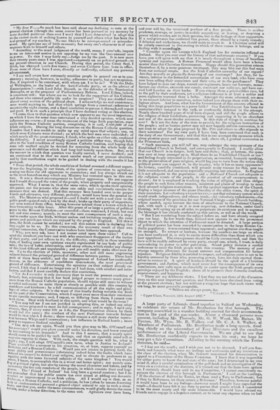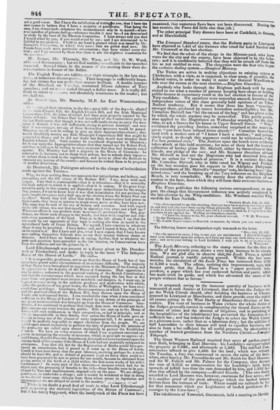A large party of Liberals dined together in Salford on
Wednesday, to celebrate the return of Mr. Brotherton for that borough. The company assembled in a wooden building erected for their accommodation in the yard of the gas-works. .Ahout a thousand persons were present, including Mr. Tbornely, Mr. 0. W. Wood, Mr. Baines, Mr Fenton, Mr. Wyse, Mr. R. Walker, mid Mr. C. A. S. Walker, al Members of Parliament. Mr. Brotherton made a long speech, dwel ling chiefly on the misconduct of Tory Minters and the excellent performances of the Liberal Government. We are glad to see that Mr. Brotherton confidently expects to retain his seat ; we hope he may get a fair Committee. Alluding to the scrutiny which the Tories threaten, he said " I fear not the result ; and I wish von not to be alarmed. I tell you fearlessly and honestly what were my feelings and sentiments and my intentions at the close of the election, when Mr. Garnett announced his determination to appeal to a Committee of the House Cemmons. I knew that it was impossible for either party to know the real state of the case ; but I determined in my own mind if, after a careful exatnination of the polhbook and an investigation of the votes on a visitation of the districts, if it turned out that the facts were against us, I certainly should have said to my Committee, I cannot consistently represent the electors of this borough in Parliament.' I said on the hustings, ' If the electors of Salford be Tories, let them send a Tory to Parliament; but if they be Reformers, let them return a Reformer.' Therefore, however painful it would have been to my feelings—however much I might have regretted the result—I should have felt it my duty to pursue that course which I considered to be the most manly and the most b000urable. I would have advised my friends not to engage in a hopeless contest, or to incur any expense when we had not a good cause. But I have the satisfaction of statingto yon, that I have the best reason to believe that I have a majority of goodIvotes. That being the ease, I am determined—whatever the inconvenience may be to myself—whatever sacrifice of private feeling—whatever trouble it may be—I am determined to abide by the issue of the Election Committee. I have always told you that I would stand by you, if you would stand by me ; and I am determined to be faithful to my promise. I hold in my hand a placard which was issued by Mr. Garnett's Committee, in which they assert that we polled dead men. My friends have made most particular examination ; they have visited every district ; and I am assured by them that there is not the slightest foundation for the iris( itice."
Mr. Baines, Mr. Thornely, Mr. Wyse, and Mr. G. W. Wood, addLs,ed the company ; but we find nothing remarkable in the speeches reported. Several times in the course of the evening there were demonstrations in favour of the Ballot.
The English Tories are talking over their triumphs in the late elec. tion, at numerous dinner-parties. Their language is sufficiently boastful, but victory has not made their orators brilliant. A double number of the Standard, on ToeNday, contained fifteen columns of Tory speeches; and we m vt r Nvaded through a duller mass. It is really dif
ficult to select not absolutely wearisome to the reader; but we shall try.
At Stoll:le:4-e, Mr. Barneby, M.P. for East Worcestershire, said— I. add call their attention to the three great bills of the day—lie alluded to , Irish Church Bill, the English Church Bill, and the Irish Municipal Cot polatious Bill, the latter of which had been most properly rejected by the liouse of Lord,. Sir Robert Peel had remarked of the Conservative party in the last Patliament, that though it was not sufficiently strong to carry the measures it desired, it was still sufficiently strong to prevent mischief: and now that it was stronger, not one of these destructive measures would be passed. Ministers would now be willing to give up their Appropriation.elause ; they would thankfully receive any Irish Municipal Corporations Bill that might be conceded to them ; and be did not doubt but they would now abandon their English Church Bill. Such conduct he considered disgraceful to Ministers; for It was upon the Appropriation-clause that they turned out Sir Robert Peel, und they would now be willing to carry measures that they bad formerly voted against. The Ministry had still a majority in the House of Commons : he rattled to it, however, not to damp their ardour, but to refresh their vigour— to induce them to look to the registration, and never to allow the Radicals to .epresent any pot non of the county—and because he wished them to be prepared or another dissolution.
At Droitwich, Mr. Pakington adverted to the charge of intimidation made against the Tories
: Why, we hear nothing from our opponents but intimidation, and bribery, and corruption, and the 301. clause of the Reform Bill ! I say' away with such th argon. I say that is contemptible—that it is ridiculous—at it is unworthy the high subject to which it is applied—that it is untrue. If the great Conservative party in this country are dependent upon intimidation for the weight they possess, I want to know how it was that intimidation did not produce the same results two years and a half ago' at the election when Sir Robert Peel was ilk Lace? Surely they will allow that when the Conservatives had power in their hands, they were as anxious to strain every nerve as they have been now. The same may be said of the cry of bribery and coercion. And with regard to the 301. clause, was not that equally in operation two years and a half ago? Whatever effects it cau produce now, were equ Illy produced then. But, gentlemen, we throw such chaiges to the winds, and treat with laughter and ridicule every accusation of the kind. Then as to the 51/1. clause, I say that the use made by our opponents of that topic is nothing else thou an insult to the agricultural body of Great Britain. For myself, I hate coercion in whatever shape it may be practised. I have before said, and I repeat it here, that I will never resort to it. But I have said also, %%hat I now repeat, that I have known men calling themselves Liberals who coerce their tenants without shame or disguise. And I have no hesitation in saying, further, that in whatever degree such practices have prevailed in the late election, we Conservatives have beeu the sufferers and not the gainers by it.
Lord Ellenborough was present at a dinner given to Mr. Dowdeswell at Tewkesbury, and spoke in reply to the toast " The Independence of the House of Lords." He • " It is impossible, gentlemen, not to see that the House of Lords has of late years been placed under circumstances of no ordinary difficulty. The majority of that I louse have been placed in opposition to the Ministers of the Crown, and iii..pposition to the majority of the House of Commons. That opposition is one Ina etofia e unknown in the practical working of the British Constitution; and that the circumstances which have occurred during the last four or five years have not produced most serious mischiefs and dangers, is, I must say, in a ;peat measure owing to the uniform prudence and moderation with which, undei the gu:datice of our great leader, the Duke of Wellington, we have exercised those privileges. Gentlemen, the circumstances to which I have referred, and the practical effect of the Reform Bill, have thrown upon the House of Lords aew arid unusual duties. lean recollect the time when it was considered sufficient in the House of Lords if we treated in one debate of the principle of sin g.eat measure which was brought up front the House of Commons. Gentlemen, if we continued to perform that single duty now, we should not faithfully execute our bust towards the public. Bills are sent up to the House of Loi.:s with such recklessness in their composition, so bad in principle, and so
t impracticable in their details, that unless the House of Lords gave at.
I: :ion to every one of the clauses of every important bill, I do assure you it .1d be perfectly impossible to expect obedience from the people. W e are leil upon almost exclusively to perform the duty of protecting the interests of the poor—we are called upon almost exclusively to protect the Established "Mitch. We have on every occasion of which I ant cognizant exercised our nuner in mitigating the severity of measures, which in principle we approve of; aud I do say, that the Poor.law Amendment Act could not have confirmed upon the 4tatute-book of this country if the House of Lords had not materially mitigated its provisions. I say that the Act for the Registration of Births would have pro• tweed an insurrection, had it passed as It came up to the House of Lords. Could it have been borne that the poor labourer, receiving perhaps Os. a week, should be tined .1.14. and in default of payment (and we know there could not have been payment) be sent to prison for one month, because he abstained from giving notice of the birth of a child within the first seven weeks of his wife's confinement ? In every part of that measure—a measure which had for its object only the procuring of benefits to the rich—those benefits were to be purchased by fines and imprisonment, imposed only on the poor. We are obliged, gentlemeti, to undertake a charge ; and it cannot be wondered at that in doing 50 we bilUtIM incur some obloquy from those whose errors in legislation and
incompetence we are obliged to unveil to the country." " acd
7_ There is no doubt a good deal of truth in what Lord Ellenborough said mcsievtiiug the slovenly legislation of the House of Commons ; but it has rarely happened, when the handywork of the Peers has been
examined, that numerous flaws have not been discovered. During the last session, the Peers did little else than job.) The other principal Tory dinners have been at Cuckfield, in Sussex, and at Macclesfield.



























 Previous page
Previous page